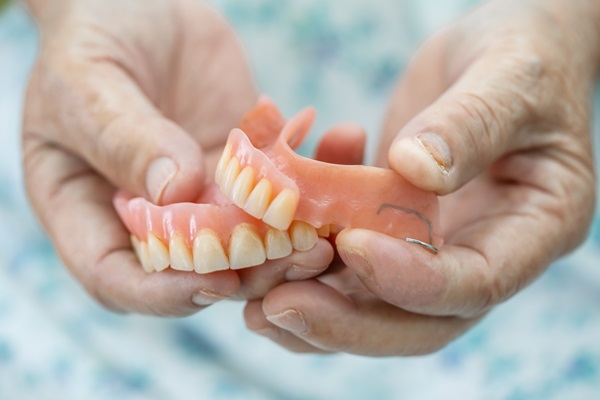When Are Partial Denture Adjustments Needed?

For many people, dentures help patients eat, speak and live life more confidently than without dentures. If you have dentures, you already know the difference they make in your quality of life, so it only makes sense to take extra good care of them. However, over time, dentures may become damaged. Eventually, your dentures will have to be adjusted, but when? Take a look below at some of the most common times partial dentures require adjustments.
Broken, chipped or cracked teeth
Denture teeth are prone to cracks, breaks and chips just from eating. When wearers bite down on hard food or attempt to eat sticky foods, there is a chance a tooth may crack, requiring repair. Teeth may also break, chip or crack when dentures are dropped. When this happens, wearers should refrain from repairing the tooth themselves and instead entrust any necessary repair work to a dentist or prosthodontist. When wearers ignore signs of damage, it may compromise the fit of the dentures over time, which can cause discomfort or pain along the gums.
Trouble chewing
When denture wearers begin having trouble chewing, it may be time for an adjustment. After all, one of the main reasons that patients get fitted for dentures is to restore their ability to chew normally. When patients first get their dentures, they have them adjusted. Over time, as the shape of the wearer’s face and jaw changes, the fit of the dentures may change and make it more difficult to chew properly.
Irritation and discomfort
Irritation and discomfort along the gums may develop over time, but it is not normal. Denture wearers experiencing pain or irritation should take it as a sign that the dentures need to be adjusted. Sensations such as jaw soreness, sharp pain near the canine teeth and discomfort mean dentures are not properly fitted. When this happens, wearers should schedule an appointment with a dentist for an adjustment as soon as possible.
Presence of oral sores
Dentures do not cause oral sores, but they can contribute to the oral conditions that make oral sores more likely to appear. For example, tiny fissures in the surface of dentures may cause canker sores to develop beneath the dentures. If left untreated, these sores can evolve into oral infections, such as thrush. Thrush is painful and can even erode a denture wearer’s gumline. As a result, patients should always notify a dentist at the first site of sores or discoloration along the gums. An adjustment may be all that is needed to fix the problem.
Changes in speech patterns
Denture wearers do not only rely on dentures for eating but for talking as well. When dentures begin to fit poorly, wearers may begin noticing themselves slurring their speech or lisping. If the problem does not go away on its own, wearers should schedule a denture adjustment. In some cases, the adjustment may involve relining the dentures.
Remedy denture issues with an adjustment today
If you are experiencing pain, discomfort, sores or trouble speaking, you may need a denture adjustment. Discomfort while wearing dentures is not normal, nor should it be. After all, dentures are designed to mimic regular teeth in look and function. If you are interested in having your dentures adjusted, contact a dentist today.
Request an appointment here: https://knoxvilledentalpartners.com or call Dental Partners South Knoxville at (865) 622-2381 for an appointment in our Knoxville office.
Check out what others are saying about our dental services on Yelp: Dentures in Knoxville, TN.
Related Posts
If you are looking for dentures, it is essential to know how to care for them properly. They can be expensive, and not everyone has the budget to keep them fresh with regular visits to the dentist.Learning about denture hygiene will help ensure that they stay clean and comfortable while fighting plaque buildup and tartar…
If you are missing several teeth on the jaw, you might consider opting for implant supported dentures. These offer an innovative solution to missing teeth and are considered more reliable than regular dentures. People were generally satisfied with replacing missing teeth with dentures. However, experts have incorporated a new and improved solution for missing teeth…
There has been a lot of talk about dental implants in recent years. Dentists recommend them, and patients benefit from the results of the treatment. Implants restore the full function of the mouth and revitalize smiles. People can enjoy newfound self-esteem and the self-image and health they have been looking for. You may wonder whether…
In some cases, Botox® and fillers are used for very similar purposes, but they are not typically interchangeable treatments. It is important to understand the differences between the two cosmetic solutions to determine which is most appropriate for meeting your specific treatment goals.Botox and dermal fillers are similar in a lot of ways, including that…
